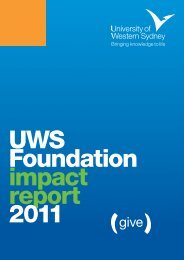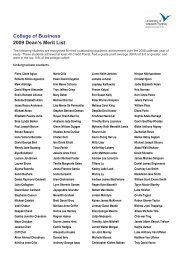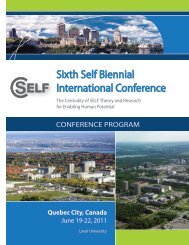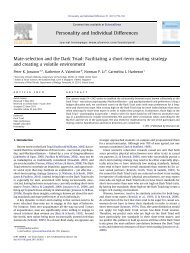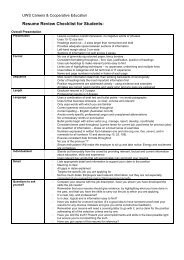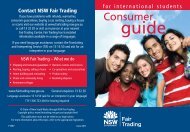Social Ecology Symposium - University of Western Sydney
Social Ecology Symposium - University of Western Sydney
Social Ecology Symposium - University of Western Sydney
You also want an ePaper? Increase the reach of your titles
YUMPU automatically turns print PDFs into web optimized ePapers that Google loves.
15 th April, 2013I am delighted to welcome participants to the 2013 <strong>Social</strong> <strong>Ecology</strong><strong>Symposium</strong>The <strong>University</strong> <strong>of</strong> <strong>Western</strong> <strong>Sydney</strong> (UWS) has a strongcommitment to sustainability in its curriculum, operations,campuses, research and engagement. As part <strong>of</strong> this commitmentUWS hosts a United Nations Regional Centre <strong>of</strong> Expertise onEducation for Sustainable Development – Greater <strong>Western</strong><strong>Sydney</strong>.In addition, the unique <strong>Social</strong> <strong>Ecology</strong> program <strong>of</strong>fered at the <strong>University</strong> <strong>of</strong> <strong>Western</strong><strong>Sydney</strong> has over many years stimulated and inspired students who have gone on tobe leaders in a range <strong>of</strong> fields.The 2013 <strong>Social</strong> <strong>Ecology</strong> <strong>Symposium</strong> promises to be another valued example <strong>of</strong> ourwork in this area.This symposium brings together many graduates withaccomplished staff and guests who are gathering to reaffirm the intellectual andpractical importance <strong>of</strong> <strong>Social</strong> <strong>Ecology</strong>.The program, featuring a series <strong>of</strong> dialogues and workshops with leading academicsand our graduates, will provide an important opportunity to grapple with the majorsocial and ecological issues that confront us. A keynote will be provided byPr<strong>of</strong>essor Stephen Kellert from Yale <strong>University</strong>, whom I warmly welcome on behalf<strong>of</strong> UWS.I <strong>of</strong>fer my very best wishes for a fruitful and stimulating meeting.Pr<strong>of</strong>essor Janice ReidVice Chancellor, UWS
The Expanding Universe <strong>of</strong> <strong>Social</strong> <strong>Ecology</strong> – <strong>Symposium</strong> April 18-19 2013, UWSHawkesburyFrom the symposium convenor –Why don’t we run a <strong>Social</strong> <strong>Ecology</strong> symposium?What a great idea!Why don’t we call it The Expanding Universe <strong>of</strong> <strong>Social</strong> <strong>Ecology</strong>?(Grin.)There have been many excited conversations, like this initial one with colleagues Stuart Hill,Carol Birrell and Margaret Somerville, in the leadup to this event. It has been gratifying tosee the level <strong>of</strong> support and interest from so many people who have been part <strong>of</strong> <strong>Social</strong><strong>Ecology</strong> at UWS over the years, as well as from an ‘expanding universe’ <strong>of</strong> people who areinterested in the ideas and issues that <strong>Social</strong> <strong>Ecology</strong> seeks to address.We are delighted to have with us Pr<strong>of</strong>essor Stephen Kellert, Tweedy Ordway Pr<strong>of</strong>essor <strong>of</strong><strong>Social</strong> <strong>Ecology</strong> from Yale <strong>University</strong>, as our keynote speaker. We are also very pleased towelcome esteemed pr<strong>of</strong>essors and guests, including Uncle Max Harrison, Richard Bawden,Susan Murphy, Stuart Hill, Margaret Somerville, Dexter Dunphy and Karen Malone. Thereare too many wonderful presenters to name them all here. A glance at the program showsthe breadth <strong>of</strong> talent joining us – and that’s only the presenters!Why ‘the Expanding Universe <strong>of</strong> <strong>Social</strong> <strong>Ecology</strong>’? (Is this some sort <strong>of</strong> global takeover bid? Is it,perhaps, one <strong>of</strong> Stuart’s ‘bold lies’?)For me it’s about expanding possibilities. It’s an invitation to come together to respond tothe pressing issues that we see emerging all around us as human societies come face to facewith ecological limits to growth on many levels and with the devastating impacts <strong>of</strong> oureconomic ‘progress’.By comparison with the issues we face, our ‘expanding universe’ may seem too easilydwarfed. However, in the many amazing initiatives that <strong>Social</strong> <strong>Ecology</strong> has given rise tothere is much to inspire us – not least our extraordinary alumni.The symposium is a chance to hear from some who have been part <strong>of</strong> the <strong>Social</strong> <strong>Ecology</strong>community about where they have taken their work. It’s also an opportunity to take stock <strong>of</strong>new developments, to recognise and re-envision <strong>Social</strong> <strong>Ecology</strong> as a project for these times.In this light, the Expanding Universe <strong>of</strong> <strong>Social</strong> <strong>Ecology</strong> symposium is also an invocation, anopportunity to draw from the larger collective as we look to the challenges ahead.In recent times, <strong>Social</strong> <strong>Ecology</strong> at UWS has received much appreciated support from theSchool <strong>of</strong> Education. We are particularly grateful on this occasion for the significant supportfor this event provided by our Acting Dean, Mary Mooney.On behalf <strong>of</strong> the organising committee I would like to thank all the presenters for theirenthusiastic willingness to participate in this event. I would especially like to thankcolleagues who have made themselves available to assist in a host <strong>of</strong> ways. In addition toStuart Hill, Carol Birrell and Margaret Somerville, Tonia Gray, David Wright, CatherineCamden-Pratt, Karin Mackay, Karen Malone, Mandy McArdle, Robyn Petersen, EmmaHolst and Claire Watts have all played crucial roles.I extend a warm welcome to all participants. Your generous participation will enable all <strong>of</strong>us to expand our <strong>Social</strong> <strong>Ecology</strong> universe!
The Expanding Universe <strong>of</strong> <strong>Social</strong> <strong>Ecology</strong><strong>Social</strong> <strong>Ecology</strong> <strong>Symposium</strong> 2013Thursday April 18 – Friday April 19 2013<strong>University</strong> <strong>of</strong> <strong>Western</strong> <strong>Sydney</strong> – Hawkesbury CampusRationale: In its 30-year history at the <strong>University</strong> <strong>of</strong> <strong>Western</strong> <strong>Sydney</strong> (UWS), <strong>Social</strong><strong>Ecology</strong> has established a unique position in the Australian educational landscape asa radical transdisciplinary program that applies ecological perspectives to enablepersonal and social action for a meaningful, equitable and sustainable world. Many<strong>Social</strong> <strong>Ecology</strong> graduates have gone on to prominent roles as leaders, thinkers andsocial activists in academic settings, government, non-government, community andbusiness organisations, and in the arts.In 2013, as growing recognition <strong>of</strong> the planetary challenges we face demands thatwe collectively address issues <strong>of</strong> sustainability, <strong>Social</strong> <strong>Ecology</strong> is more relevant thanever. A recent major publication (<strong>Social</strong> <strong>Ecology</strong>: Applying Ecological Understanding toOur Lives and Our Planet) has attracted significant international attention. Our staffhave received awards for sustainability education and creative pedagogies fortransformation, and we have been joined and reinvigorated by recent high levelappointments.Aims: Our Expanding Universe <strong>of</strong> <strong>Social</strong> <strong>Ecology</strong> symposium will reaffirm theimportance <strong>of</strong> the <strong>Social</strong> <strong>Ecology</strong> project. We aim to take stock <strong>of</strong> our successes, tolearn from the achievements <strong>of</strong> our graduates and, most importantly, to renew andre-imagine the <strong>Social</strong> <strong>Ecology</strong> agenda in light <strong>of</strong> recent developments and pressingneeds for social change to achieve global and local sustainability.The symposium will probe current challenges and explore what it might take toreshape society, and ourselves, for the crucial work <strong>of</strong> responding to planetaryecological threats and growing social inequities. It will showcase the amazing workbeing done by social ecologists in leading change for sustainable futures.We invite you to join with us to help us reaffirm and redefine the <strong>Social</strong> <strong>Ecology</strong>project to play a leading role in promoting a sustainable society and to proactively beready to meet the challenges ahead.3
The Expanding Universe <strong>of</strong> <strong>Social</strong> <strong>Ecology</strong> – <strong>Symposium</strong> April 18-19 2013, UWSHawkesburyProgram featuresIn order to feature a range <strong>of</strong> presenters and promote dialogue the program includesa series <strong>of</strong> panel discussions dealing with core themes addressed in <strong>Social</strong> <strong>Ecology</strong> asit has evolved at UWS.Our distinguished keynote speaker, Pr<strong>of</strong>essor Stephen Kellert, will discuss hissignificant new publication, Birthright: People and Nature in the Modern World.A series <strong>of</strong> workshops will provide an additional experiential focus and choice forparticipants.Panel themes<strong>Social</strong> <strong>Ecology</strong>: Applying ecological understanding for transformative educationEcological psychology and cultural changeCommunity arts in actionSense <strong>of</strong> place<strong>Ecology</strong> and advocacyLeading changeEcological futuresWorkshop optionsIntegral consciousness and Awe-ismEcologically aware counselling and psychotherapyBeyond our imagination: What women wantChange the dream, awakening the dreamerGetting in touch with your voiceReCREATING and rEcreating/EarthCare site visitThe Koan <strong>of</strong> the EarthNature tales: an experience in belonging to the worldAdditional featuresBeneath the Surface Art exhibition – in the Northside function roomLandscape <strong>of</strong> <strong>Social</strong> <strong>Ecology</strong> symposium: cultural mapping using mixed mediaSpecial Thursday evening program<strong>Symposium</strong> dinnerBiophilic Design documentary screening and discussion with Pr<strong>of</strong>essor KellertCampfire and storytelling with Uncle Max Harrison4
The Expanding Universe <strong>of</strong> <strong>Social</strong> <strong>Ecology</strong> – <strong>Symposium</strong> April 18-19 2013, UWSHawkesburyRegistrationFees: Full registration (two days) $160, or $130 concession.One day registration fee $110Optional Thursday evening program, including dinner and documentaryscreening $40 ($30) concession.Payment can be made via the UWS iPay system to make your payment. Follow thelink from the symposium registration page.Please note: Registration is confirmed when payment is made via electronic transferonly. Registration payments can be made by credit card or direct transfer. Cashpayments cannot be accepted.Getting to the campusThe campus is walking distance from the East Richmond train station. If coming bytrain access the campus via the Bourke St entrance. If coming by car from Blacktownyou can enter the campus from Richmond Rd or from Penrith via Londonderry Rd.Please refer to UWS website directions for further details.Parking on campus<strong>Symposium</strong> participants can park without charge provided that you park in theyellow bays only in P14 carpark, which is behind the G6 precinct.<strong>Symposium</strong> venuesThe attached map clearly highlights the symposium venues.All daytime program events will be held in building G6 (except the EarthCare visit).Please check in at the registration desk outside the main lecture theatre, G6.G.43.Registration check-in will be open from 8am on Thursday 18 th April. The programwill start promptly at 8:30am.The Northside function centre (L2) is the venue for the Art exhibition, for lunchesand for the Thursday evening dinner and documentary showing. Thursday night’scampfire will be held at EarthCare.5
<strong>Social</strong> <strong>Ecology</strong> <strong>Symposium</strong> – The Expanding Universe <strong>of</strong> <strong>Social</strong> <strong>Ecology</strong> Program day 1THURSDAY 18 TH APRIL8:008:309:0010:3011:0012:301:303:003:305:006:007:30RegistrationWelcome to Country – Uncle Greg Simms, Elder on CampusUWS welcome - Pr<strong>of</strong>essor Steve Wilson, Deputy Vice Chancellor (Academic Planning)<strong>Symposium</strong> welcome – Brenda Dobia, Convenor<strong>Social</strong> <strong>Ecology</strong>: Applying ecological understanding for transformative education G6.G.43Facilitator: David WrightStuart Hill; Richard Bawden; Karen Bridgman; Rosie Solomona; David WrightEcological psychology and cultural changeG6.G.43Facilitator: Brenda DobiaSusan Murphy; Brendon Stewart; Sally Gillespie; Brenda DobiaBirth, death... and everything in between: Community arts in actionFacilitator: Catherine Camden-PrattG6.G.43Karin Mackay; Graeme Frauenfelder; Michael Chew; Brendan Penzer;Trypheyna McShane; Catherine Camden-PrattSense <strong>of</strong> PlaceG6.G.43Facilitator: Carol BirrellMax Dulumunmun Harrison; Margaret Somerville; Susan G<strong>of</strong>f; CarolBirrellMorning tea – G6.1.15Lunch - NorthsideAfternoon tea – G6.1.15Workshop: Integral consciousness G6.1.18Presenters: Ben Weiss, Nicola Parker, Philip Jackson + special guestGraham BirdWorkshop: Ecologically aware counselling and psychotherapy G6.1.18Presenter: Werner Sattman-FreseWorkshop: Beyond our imagination – What women want G6.1.18Presenter: Geraldine O’ConnorMovie Screening & discussion: Biophilic Design - the architecture <strong>of</strong> Life<strong>Symposium</strong> dinner - Northside8:00 Campfire stories with Uncle Max Harrisonat EarthCare Centre6
<strong>Social</strong> <strong>Ecology</strong> <strong>Symposium</strong> – The Expanding Universe <strong>of</strong> <strong>Social</strong> <strong>Ecology</strong> Program – day 2FRIDAY 19 TH APRILKeynote and panels - G6.G.43Workshops8:00 Change the dream,Awakening thedreamerPresenters: Ben Weiss,Bozena Sawa, VictoriaPhillips G6.1.169:0010:3011:0012:301:303:003:305:00Getting in touch withyour voicePresenter: JosephineTrumanKeynote: Birthright – People and Nature in the Modern World G6.G.43Guest speaker: Stephen KellertFacilitator: Tonia GrayMorning tea – G6.1.15<strong>Ecology</strong> and advocacyG6.G.43 Workshop: ‘The Koan <strong>of</strong> the Earth’ G6.1.18Facilitator: Karen MalonePresenter: Susan MurphyCharlie Brennan; Tony Webb; Bruce Fell; Karen MaloneG6.1.18ReCREATING andrEcreating, plusEarth Care Centre sitevisitPresenters: CraigDuckmanton andEric BrockenEarth Care CentreLunch - NorthsideLeading change for personal, social and planetary wellbeingWorkshop: Nature tales – An experience in belonging to the worldFacilitator: Stuart HillG6.G.43 G6.1.18Christina Kirk; Dexter Dunphy; Dale Hunter; David Bubna-Litic Presenter: Kumara WardAfternoon tea – G6.1.15Ecological futuresG6.G.43Facilitator: Margaret SomervilleMargaret Somerville; Karen Malone; Stephen Kellert; Stuart HillClosing7
The Expanding Universe <strong>of</strong> <strong>Social</strong> <strong>Ecology</strong> – <strong>Symposium</strong> April 18-19 2013, UWS HawkesburyTHURSDAY 18TH APRILSession 1: 9-10:30amPanel presentation: <strong>Social</strong> <strong>Ecology</strong> – applying ecological understanding fortransformative educationLearning about learning is a central focus in <strong>Social</strong> <strong>Ecology</strong>’s approach to education.Pr<strong>of</strong>essor Stuart B. Hill was the Foundation Chair <strong>of</strong> <strong>Social</strong> <strong>Ecology</strong> at UWS from1996 to 2009. He is now an Adjunct Pr<strong>of</strong>essor in the School <strong>of</strong> Education. `Stuarthas published over 350 papers and reports. His latest books are EcologicalPioneers: A <strong>Social</strong> History <strong>of</strong> Australian Ecological Thought and Action (with DrMartin Mulligan; Cambridge UP, 2001), Learning for Sustainable Living: Psychology<strong>of</strong> Ecological Transformation (with Dr Werner Sattmann-Frese; Lulu, 2008) and<strong>Social</strong> <strong>Ecology</strong>: Applying Ecological Understanding to our Lives and our Planet (withDavid Wright and Catherine Camden-Pratt: Hawthorn, 2011).Richard Bawden, OAM, is Pr<strong>of</strong>essor Emeritus at UWS, an adjunct pr<strong>of</strong>essor atMichigan State <strong>University</strong>, a visiting pr<strong>of</strong>essor at the Open <strong>University</strong> in the UK,and a Fellow and Director <strong>of</strong> the Systemic Development Institute. He has workedin systemic development projects in more than two dozen countries. He has beena Visiting Pr<strong>of</strong>essor at Cornell, Minnesota, Rutgers and Michigan StateUniversities, at the <strong>University</strong> <strong>of</strong> Kwazulu-Natal and at the Open <strong>University</strong> inthe UK, and has published more than 150 peer-reviewed articles and bookchapters. Richard is Chair <strong>of</strong> the Hawkesbury Foundation and is working onideas for a major initiative in sustainable well-being on the Hawkesbury Campus.Karen Bridgman lectures at the <strong>University</strong> <strong>of</strong> <strong>Sydney</strong> in the Masters <strong>of</strong> HerbalMedicine. She has been on the Academic Review Committees <strong>of</strong> the SouthernCross <strong>University</strong> School <strong>of</strong> Complementary Medicine (Lismore) and the<strong>University</strong> <strong>of</strong> New England (Armidale). Coming from a Nuclear Medicinebackground, Karen has been working clinically as a Naturopath for over 20years, the last fifteen in a holistic medical practice (Pymble Grove Health Centre)and a private pathology laboratory (<strong>Sydney</strong>).Roseanna Henare-Solomona is originally from the Ngati Hine and Ngapuhi tribes(Maori) <strong>of</strong> Aotearoa New Zealand. Her PhD explored the changes to Maoriidentity and culture when whanau (families) leave the homeland and migrate tolive in Australia. Roseanna has held numerous positions on government advisoryboards and community based committees. She aspires to empower people througheducation and has successfully mentored Aboriginal, Maori, Pacific Island throughtheir studies. Roseanna currently teaches in the School <strong>of</strong> Management at UWS.David Wright is Director <strong>of</strong> Higher Degree Research in the School <strong>of</strong> Education. Heteaches in the overlapping fields <strong>of</strong> <strong>Social</strong> <strong>Ecology</strong>, Transformative Learning,Creativity and Sustainability and researches on cognition, embodiment,performance, creativity, learning and systems thinking. His particular interests arein relationships that facilitate understanding and in creative communication <strong>of</strong>learning. He has published on cognition, learning, drama, embodiment,constructivism and creativity. He has written plays and creative fiction, andrecently edited <strong>Social</strong> <strong>Ecology</strong>: Applying Ecological Understanding to our Lives and ourPlanet (with Stuart Hill and Catherine Camden-Pratt: Hawthorn, 2011).8
The Expanding Universe <strong>of</strong> <strong>Social</strong> <strong>Ecology</strong> – <strong>Symposium</strong> April 18-19 2013, UWS HawkesburySession 2: 11am-12:30pmPanel presentation: Ecological psychology and cultural changeDr Susan Murphy is both a writer and authorised Zen teacher and lineage-holder,teaching since 1998. In 1997 Susan was awarded a a five-year QEII ResearchFellowship by the Australian Research Council in social ecology for a study <strong>of</strong>sense <strong>of</strong> place based mainly in film and radio work. Her most recent book (also e-book) is Minding the Earth, Mending the World: the <strong>of</strong>fer we can no longer refuse,Picador, <strong>Sydney</strong>, 2013, a detailed, Zen-inspired response to the tremendous koanpresented to the world in our life-times by the environmental crisis we all face.Dr Brendon Stewart joined UWS in 1992 taking up a position in the School <strong>of</strong><strong>Social</strong> <strong>Ecology</strong>. He recently retired from the position <strong>of</strong> Senior Lecturer andacademic coordinator <strong>of</strong> the Master <strong>of</strong> Analytical Psychology, in the School <strong>of</strong>Psychology at UWS. His research brings together analytical psychology, Buddhistthought, cultural studies, ecological theory, creativity and learning and includesextensive research with recently arrived migrants in <strong>Western</strong> <strong>Sydney</strong>. CurrentlyBrendon is working with the Cana Communities in inner city <strong>Sydney</strong> and is alsoinvolved in organising acute need shelters for homeless men. Brendon is a long time student <strong>of</strong> ZenBuddhism.Sally Gillespie is a doctoral candidate at the <strong>University</strong> <strong>of</strong> <strong>Western</strong> <strong>Sydney</strong>researching ‚Climate Change and Psyche: Myths, Dreams and Conversations‛. Sheis the author <strong>of</strong> Living the Dream, The Book <strong>of</strong> Dreaming and co-author <strong>of</strong> The Knot <strong>of</strong>Time, as well as contributor to Depth Psychology, Disorder and Climate Change editedby Jonathan Marshall. Sally practised as a Jungian psychotherapist for over twentyyears and served as the President <strong>of</strong> the CG Jung Society <strong>of</strong> <strong>Sydney</strong> from 2006 to2010.Brenda Dobia is senior lecturer and Academic Course Advisor for the MEd (<strong>Social</strong><strong>Ecology</strong>) in the School <strong>of</strong> Education at UWS. She teaches and researches in socialecology and teacher education and has active interests in sustainability education,ecopsychology, cultural psychology and wellbeing. In 2012 she was awarded anAustralian Office for Learning and Teaching citation for her curriculum design andteaching and a UWS Vice Chancellor’s excellence award for sustainability. Brendacurrent research interests are in the social-emotional wellbeing <strong>of</strong> Aboriginalstudents and in education for sustainability.Workshop option: Integral ConsciousnessIntegral Consciousness as presented in Jean Gebser's seminal work The Ever Present Origins(trans. N. Barstad with A. Mickunas, 1984). The workshop will initially take the form <strong>of</strong> adialogue led by myself and Nicola Lambert and Philip Jackson, both <strong>of</strong> whom have beeninvolved in the SE Masters programme and in a previous workshop on this theme. It willthen involve some experiential work to engage the participants in an experience <strong>of</strong> anemerging integral consciousness using the chakras, the alchemical elements and periods <strong>of</strong>cultural history when each <strong>of</strong> Gebser's structures <strong>of</strong> consciousness may have evolved. Theworkshop will conclude with a discussion <strong>of</strong> how the emerging integral consciousness can addressthe ecological crisis on the planet.With special guest, Graham Bird, former Senior Lecturer in <strong>Social</strong> <strong>Ecology</strong>, UWS, (retired 1996which seems a long time ago!) on Cosmic Awe-ism or more simply Aweism.9
The Expanding Universe <strong>of</strong> <strong>Social</strong> <strong>Ecology</strong> – <strong>Symposium</strong> April 18-19 2013, UWS HawkesburyDr Ben-Zion Weiss, a community educator in social ecology, meditation, yoga,drama, ESOL, cross-cultural conflict and non-violence training. He lectures/tutorsat UWS, consults for Multicultural Programs in Cooling Conflicts. His PhDresearch is on anti-racism drama education. He has written a book based on histhesis and has written for other publications.Nicola Lambert has lived her passion through her involvement in social-ecologicalperspectives as expressed through her life and work in psychotherapy, counselling,coaching, and the coach training industry that she is involved in. Nicola washonoured with the award <strong>of</strong> ‚2011 Coach <strong>of</strong> the Year‛ by ICF.Philip Jackson is passionate about dialogue and transformativeconversation. A graduate <strong>of</strong> the Masters <strong>of</strong> <strong>Social</strong> <strong>Ecology</strong>, Philip's work centresaround the importance <strong>of</strong> generating a deep connection between each other andwith the natural environment to facilitate and propel authentic change andunderstanding.Session 3: 1:30-3pmPanel presentation: Birth, death and everything in between - community arts inactionTrypheyna McShane is a mother, grandmother, artist, environmental educatorand storyteller, with a Masters in Applied Science, <strong>Social</strong> <strong>Ecology</strong>. As a communityartist she has worked with Aboriginal communities, people with disabilities, youngand old. Trypheyna has been a wildlife artist and educator for Taronga & <strong>Western</strong>Plains Zoos and provided ecological interpretive business consulting to many largeorganisations. She is an award winning sculptor and author <strong>of</strong> The Intimacy <strong>of</strong> Death& Dying. Trypheyna believes that the Arts are vital to finding creative solutions to ecological,economic, health and social issues.Graeme Frauenfelder is a global adventurer <strong>of</strong> playfulness, creativity andkindness. He came to the undergraduate <strong>Social</strong> <strong>Ecology</strong> community at Hawkesburyin 1999 to heal, have a place <strong>of</strong> belonging and taste experiential learning. Hishonours thesis explored the value and role <strong>of</strong> creativity and the arts in enriching thehuman spirit in international community development projects in Zambianvillages. A tutor at UWS, Graeme is part <strong>of</strong> sharing <strong>Social</strong> <strong>Ecology</strong> in the educationunits "Learning and Creativity" and "Education and Transformation".Karin Mackay is a working artist and has considerable experience with youth andwomen’s community groups using a stories and art approach to create a sense <strong>of</strong>community and raise awareness <strong>of</strong> important cultural and ecological issues. Karinfounded The Women’s Room Centre for Women’s Wellbeing in The Blue Mountainswhich curated the popular Earthspirit Festival and women’s art exhibitions for 5years. Karin now works with The School <strong>of</strong> Education in the areas <strong>of</strong> Education forSustainability, Learning and Creativity and Diversity, <strong>Social</strong> Justice and Equity.Michael Chew is an environmentalist, freelance photographer and communitycultural development practitioner. Michael is passionate about the power <strong>of</strong>creativity and storytelling to empower individuals and strengthen communities,and has initiated various community arts projects in Melbourne and India,Indonesia, Bangladesh and East Timor. He recently returned from a year workingon climate adaptation in Bangladesh and is finishing a MEd (<strong>Social</strong> <strong>Ecology</strong>) atUWS. He is excited about positive news stories and future visions, and is planningfor a global journey to document, collect and share these stories with the world.10
The Expanding Universe <strong>of</strong> <strong>Social</strong> <strong>Ecology</strong> – <strong>Symposium</strong> April 18-19 2013, UWS HawkesburyBrendan Penzer is the founding Director and Curator <strong>of</strong> ‚At The Vanishing Point –Contemporary Art Inc.‛ (ATVP) in Newtown NSW. Established in 2007, ATVP hasbecome a leading organisation in the <strong>Sydney</strong>’s arts-scene, renowned for itsdevelopment <strong>of</strong> emerging artistic practice and early career arts pr<strong>of</strong>essionals whilstredefining the artists-run-initiative/gallery model with its focus on the developmentand nurturing <strong>of</strong> community (artists and audiences), social and political awareness,support <strong>of</strong> indigenous and refugee artists and its emphasis on environmentalsustainability initiatives.Catherine Camden-Pratt is an artist educator passionate about education forpersonal and social change. Catherine began teaching in <strong>Social</strong> <strong>Ecology</strong> at UWS in2000 and has contributed to building the field with particular interests in arts-basedresearch, pedagogy and social ecology She was awarded a UWS CoA TeachingExcellence award in 2007 and in 2010, an ALTC citation for OutstandingContributions to Student Learning. As well as academic publications - most recentlyediting <strong>Social</strong> <strong>Ecology</strong>: Applying Ecological Understanding to our Lives and our Planet(with David Wright and Stuart Hill; Hawthorn, 2011), Catherine has exhibited herartwork, published a popular press book Out <strong>of</strong> the Shadows; daughters growing upwith a ‘mad’ mother (Finch 2006) and performed co-written research plays.Workshop option: Ecologically Aware Counselling and PsychotherapyThis workshop provides participants with opportunities to explore this holistic and integratedapproach to mental health practice through brainstorming, watching a brief PowerPointpresentation, and discussion. This social ecology informed approach conceptualises mental andpsychosomatic dis-ease not only as caused by early attachment difficulties, but by a whole range <strong>of</strong>interconnected past and present factors including unsupportive lifestyle choices, environmentalhealth hazards, and stressful socioeconomic working and living conditions.The workshop is designed to enable individuals working in the health, community development,and social change sectors to enhance their understanding <strong>of</strong> the importance <strong>of</strong> using ecologically,somatically, and culturally aware ways <strong>of</strong> working with individuals and groups.Werner Sattmann-Frese completed a training program in holistic psychotherapyin 1984 and has since been working as a psychotherapist, supervisor and trainer.Holding a Master <strong>of</strong> Applied Science and PhD degree attained at the <strong>University</strong> <strong>of</strong><strong>Western</strong> <strong>Sydney</strong>, Werner is currently working as a senior lecturer and projectmanager at the Jansen Newman Institute in <strong>Sydney</strong>.Session 4: 3:30-5pmSense <strong>of</strong> PlaceUncle Max Dulumunmun Harrison is a Yuin Elder and senior lawman. He haspublished a book in 2010 called My People's Dreaming. Uncle Max has spent alifetime working with his own people to transmit cultural knowledge, as well asteaching other non-Indigenous people about Aboriginal culture. He has attendedinternational conferences/gatherings, taught in schools and universities tostudents <strong>of</strong> all ages, been involved in research projects, and continues to takepeople on journeys to his country (far south coast NSW and Snowy Mts toVictoria) to enable all to connect deeply with Mother Earth. He has a long term relationship withUWS through <strong>Social</strong> <strong>Ecology</strong>. He is presently working with Dr Carol Birrell on his second bookwhich will also be a documentary and interactive website.11
The Expanding Universe <strong>of</strong> <strong>Social</strong> <strong>Ecology</strong> – <strong>Symposium</strong> April 18-19 2013, UWS HawkesburyMargaret Somerville is Pr<strong>of</strong>essor <strong>of</strong> Education in the School <strong>of</strong> Education andDirector <strong>of</strong> the Centre for Educational Research. A pioneer in place studies ineducation she has a long history <strong>of</strong> collaboration with Indigenous communitiesabout their relationship to place. Her first <strong>of</strong> five authored books, 'Ingelba and theFive Black Matriarchs' with Aboriginal Elder Patsy Cohen, was described as 'thebest politically informed oral history ever produced in Australia'. Her enduringfocus in this work is in articulating what non-Indigenous Australians can learnabout living in this land from the oldest continuing culture in the world. Her latestbook, 'Water in a Dry Land', published in Routledge's Innovative Ethnography Series, is an outcome<strong>of</strong> this long term research interest.Susan G<strong>of</strong>f is a participatory systems facilitator. With a background in theatre artsand social ecology, Susan has worked as an independent scholar through herconsultancy, CultureShift, since 1991. She has designed, facilitated anddocumented over 50 participatory research, learning and evaluation strategies inthe public domain, and across several policy arenas embracing social andenvironmental threats to intergenerational sustainability. As well as running herown consultancy, Susan is a past President and Life Member <strong>of</strong> the ActionLearning Action Research Association and also works as a casual academic at the <strong>University</strong> <strong>of</strong><strong>Sydney</strong> and the <strong>University</strong> <strong>of</strong> <strong>Western</strong> <strong>Sydney</strong>, examines action research doctorates and supervisespost-graduate degree students engaging in participatory methodologies.Carol Birrell is an artist, writer and academic exploring the interaction between anIndigenous and <strong>Western</strong> sense <strong>of</strong> place. She is a lecturer in <strong>Social</strong> <strong>Ecology</strong> at the<strong>University</strong> <strong>of</strong> <strong>Western</strong> <strong>Sydney</strong> and previously taught Aboriginal Education atWollongong <strong>University</strong>. Her earth-based arts practice for the last 12 years, called‘ecopoiesis’, draws together movement, painting, photography, environmentalsculpture and poetry, along with Indigenous understandings as a base forecological writing and exploring ecological identity. Carol has strong long-termcollaborative relationships with Aboriginal communities: Yuin (south coast NSW) and Worrorra(west Kimberley). At present, she is writing a book on the life and teachings <strong>of</strong> distinguished YuinSenior Lawman and Elder Max Dulumunmun Harrison and developing research in the field <strong>of</strong>ecopedagogies.Workshop option: Beyond our imagination – What women want'Imagining affordable, secure and connected housing for older women' This workshop seeks toexplore the application <strong>of</strong> Presencing and Theory U beyond organisational behaviour. 'Imaginingaffordable, secure and connected housing for older women' will be the topic for this exploration.The intention is to draw together people with knowledge <strong>of</strong> Presencing and Theory U to dialogueon how these processes support us to ‘shift from recreating the past to manifesting or realizing anemerging future’ (Senge et al:2004;7). This Open Space workshop will be <strong>of</strong> interest to those: withknowledge and experience working with Presencing and Theory U; interested in the application <strong>of</strong>Presencing and Theory U beyond organisational behaviour; wanting to hear about Presencing andTheory U; curious about imagining affordable, secure and connected housing.Geraldine O'Connor is the Senior Programs Officer for the Centre for LocalGovernment at <strong>University</strong> <strong>of</strong> Technology <strong>Sydney</strong> where she works to improve theskills and image <strong>of</strong> Local Government employees. Previous to this, Geraldineworked as a Strategic Planner in Local Government for a long time. Her interestsinclude capacity building and the need for improved connectivity in thegovernment sector.12
The Expanding Universe <strong>of</strong> <strong>Social</strong> <strong>Ecology</strong> – <strong>Symposium</strong> April 18-19 2013, UWS HawkesburyFRIDAY, 19 TH APRILSession 5: 8-8:50amWorkshop option 1: Change the Dream, Awakening the DreamerThe workshop will be an introduction to the Change the Dream, Awakening the Dreamersymposium, which is intended to bring forth an environmentally sustainable, spiritually fulfillingand socially just human presence on the Earth. This purpose is closely aligned with the work <strong>of</strong> thefield <strong>of</strong> social ecology. The symposium has now been presented in Australia and internationallymany times for thousands <strong>of</strong> participants and represents a real force <strong>of</strong> change world-wide. I willco-present the introduction with two experienced facilitators, Victoria Philips, a social ecologypostgrad student, Bozena Sawa, the representative <strong>of</strong> the Pachamama Alliance in NSW. Please seethe link for the symposium trailer http://www.youtube.com/watch?v=MoXJZ_3-J9wDr Ben-Zion Weiss, a community educator in social ecology, meditation, yoga, drama, ESOL, crossculturalconflict and non-violence training. He lectures/tutors at UWS, consults for MulticulturalPrograms in Cooling Conflicts. His PhD research is on anti-racism drama education. He has writtena book based on his thesis and has written for other publications.Bozena Sawa - member <strong>of</strong> the Guardianship Council and NSW co-ordinator for Be The Changeorganisation that supports Pachamama <strong>Symposium</strong> initiative in Australia. Facilitator <strong>of</strong> Awakeningthe Dreamer Change the Dream workshops since 2010. Proud to be part <strong>of</strong> a global movementaiming at creating fulfilling, just and sustainable world.Victoria Phillips, activist, qualified whole foods chef, counsellor from East-WestCommunity Health Centre, London, co-director <strong>of</strong> Australian School <strong>of</strong>Macrobiotics, active participant <strong>of</strong> Transition, Bondi beach and a facilitator forthe Pachamma alliance. Student <strong>of</strong> <strong>Social</strong> ecology.Workshop option 2: Getting in touch with your own voiceIn our world today it is easy to feel powerless in the face <strong>of</strong> information overload and growingawareness <strong>of</strong> environmental problems which sometimes feel too numerous and large tomeaningfully tackle. We can easily feel we have lost our own voice amongst the myriad <strong>of</strong> voiceswhich swirl around us through the media and social media. This workshop is about getting intouch with your own voice and empowering yourself through this connection between your voiceand your self. It is about the embodied voice. In this workshop I take participants through breathingexercises, group and solo singing and play through vocal improvisation and movement, withimagery and visualisations guiding the process. Workshop participants will explore both theinternal and external spaces their voices occupy, and will have the chance to connect with others innew and unique, non-verbal ways. There is no "standard" or judgement about attaining a "good"voice- it is the process and journey that is important. Respect is shown for where each individualvoice is "at", with no pressure applied to extend beyond that which is possible and comfortable foreach individual.Josephine Truman is a singer/composer performer/writer and artist. She is therecipient <strong>of</strong> a Special Purpose Award and International Study Grant from theMusic Board (Australia Council) which took her to Europe to research the voiceand extended vocal techniques. She has performed with many contemporaryjazz groups and festivals; her commissioned work has featured in radiophonicworks and Horspiel, nationally and internationally . Jo was recently a guestperformer at MONA FOMA (Hobart), where she also conducted a vocalworkshop for 85 people at the Baha'i Centre, Hobart.13
The Expanding Universe <strong>of</strong> <strong>Social</strong> <strong>Ecology</strong> – <strong>Symposium</strong> April 18-19 2013, UWS HawkesburyWorkshop option 3: ReCREATING and rEcreating - rethinking ecology <strong>of</strong> ourgardens plus Earth Care Centre site visitBefore we shut ourselves <strong>of</strong>f from the neighbourhood, with walls, hedges and double spacedgarages, we should start to think about what we want from our community or neighbourhood andwhy we should really think about how we participate and engage; how our children are seeing theworld as they grow and how we are pushing nature behind us and allowing technology to over-runus. I will address NOISE and garden mechanisation; Imagination and technology; generationalinferences; freedom to roam; community and isolation; walking and talking and engaging. It's lossthrough stealth, and before we blink, it's almost gone.Craig Duckmanton has had a career in marketing roles with large and small organisations, and anumber <strong>of</strong> years working for himself. Later in life, he's been looking to change the way he worksand contributes. A Masters in <strong>Social</strong> <strong>Ecology</strong> started the change, permaculture added to it, and nowwriting, talks and community engagements, sharing <strong>of</strong> ideas and pragmatic applications arecreating worth and great satisfaction. As a protest to the noise and over engineered gardenmechanisation, he started "The Quiet Gardener" to quietly support human powered gardening andthe s<strong>of</strong>tness and pleasure we enjoy from urban nature and the garden, it's mantra "DePower;DeDecibilise ... DeLightful"Hawkesbury EarthCare Centre serves as a focus and gathering place for people learning andworking together for responsible stewardship <strong>of</strong> the Earth. The EarthCare philosophy is based onthe principle that the needs <strong>of</strong> current generations <strong>of</strong> Earth inhabitants should be met withoutcompromising the ability <strong>of</strong> future generations to meet their needs. From its beginnings as anexperimental organic growing project the Centre has developed into a broad-based sustainableliving organisation. It promotes environmentally responsible land use, appropriate technologies forindustry and human settlement and the development <strong>of</strong> healthy and self-reliant communities.Session 6: 9-10:30amKeynote: Birthright – People and Nature in the Modern WorldDr. Stephen R. Kellert is the Tweedy Ordway Pr<strong>of</strong>essor Emeritus <strong>of</strong> <strong>Social</strong><strong>Ecology</strong> and Senior Research Scholar at the Yale <strong>University</strong> School <strong>of</strong>Forestry and Environmental Studies. His work focuses on understandingthe connection between nature and humanity with a particular interest inthe human need for nature, environmental conservation, and sustainabledesign and development. He recently completed, with Bill Finnegan in2011, a 60-minute documentary video, ‚Biophilic Design: the Architecture<strong>of</strong> Life‛. Pr<strong>of</strong>essor Kellert will be sharing insights from his most recentpublication Birthright: People and Nature in the Modern World.Session facilitator:Tonia Gray joined UWS in 2012 as an Associate Pr<strong>of</strong>essor, appointed to theCentre for Educational Research at UWS as a Secondary Specialist in Pedagogyand Learning. Her research interests include: eco-pedagogy, human-naturerelationships, and reflection and experiential learning in a variety <strong>of</strong> educationalsettings. With a wealth <strong>of</strong> experience in outdoor education, curriculum design,implementation and evaluation spanning over three decades, she was awardedan ALTC Teaching Citation in 2009 and a major grant in 2010 to introduce reflective andexperience-based learning to international education within tertiary settings.14
The Expanding Universe <strong>of</strong> <strong>Social</strong> <strong>Ecology</strong> – <strong>Symposium</strong> April 18-19 2013, UWS HawkesburySession 7: 11am-12:30pmPanel presentation: <strong>Ecology</strong> and advocacyBruce Fell lectures at Charles Sturt <strong>University</strong> in visual literacy and screenproduction. He is six years into a longitudinal research project ‘Visible andInvisible Communication’ looking at issues surrounding communication,wellbeing and ecological sustainability. Bruce’s recent publications are: Bring thenoise: has technology made us scared <strong>of</strong> silence? (2012), The Power AndInfluence Of The Synthetic Cortex in <strong>Social</strong> <strong>Ecology</strong> (2011), My Story, Your Story:Talking About Television, <strong>Ecology</strong> and Wellbeing (2010), Television & ClimateChange: The Season Finale (2009).Charlie Brennan works as an academic at Southern Cross <strong>University</strong> and as asustainability consultant working on ‘Sacred Places’ projects. Charlie’s teachingand research revolve around working towards environmental and communitysustainability, applied ethics, social inclusivity and ‘sense <strong>of</strong> place’. His area <strong>of</strong>practice and interest lies in the intersections <strong>of</strong> practice and theory, communityand the environment. Specifically, his focus is upon putting sustainability ideas,ideals, design and targets into practice – which was the subject <strong>of</strong> his PhD thesisSituating Place-Practice.Karen Malone was recently appointed Pr<strong>of</strong>essor <strong>of</strong> Education in the School <strong>of</strong>Education at UWS. Dr Malone is also Chair and Founder <strong>of</strong> the Child FriendlyAsia-Pacific network and a member <strong>of</strong> the UNICEF International ResearchAdvisory Board for Child Friendly Cities. She is also Asia-Pacific Director <strong>of</strong> theglobal UNESCO-MOST Growing Up In Cities (GUIC). In the past ten yearsPr<strong>of</strong>essor Malone has attracted over 2 million dollars in research grants, awardsand consultancies and has published 5 books, 14 book chapters and over 50refereed publications focusing on child friendly cities, childhood sociology, earlychildhood, children's participation, children's environments, environmentaleducation, sustainability, urbanisation and participatory and child-centred research methodologies.Workshop option: The Koan <strong>of</strong> the EarthDrawing on the resources <strong>of</strong> the mind in relative stillness and the ancient tradition <strong>of</strong> the Zen koan,I will <strong>of</strong>fer a series <strong>of</strong> brief, direct experiments in touching a state <strong>of</strong> mind more intimately in touchwith the mind <strong>of</strong> the Earth. A 'koan' (like the Earth) is not a 'riddle' or a 'paradox', but is (like theEarth) a matter to be resolved. To resolve a koan you must find your way past what it is you think,or think you know, to where you can share the mind <strong>of</strong> the koan, unencumbered by assumptions.This (like the current state <strong>of</strong> the Earth in crisis) is an invitation into radical uncertainty, and into thesurprising resilience, creativity and harmonising <strong>of</strong> mind that opens up in that surprising place.Dr Susan Murphy is both a writer and authorized Zen teacher and lineage-holder, teaching since1998. In 1997 Susan was awarded a five-year QEII Research Fellowship by the Australian ResearchCouncil in social ecology for a study <strong>of</strong> sense <strong>of</strong> place based mainly in film and radio work. Hermost recent book (also e-book) is Minding the Earth, Mending the World: the <strong>of</strong>fer we can no longerrefuse, Picador, <strong>Sydney</strong>, 2013, a detailed, Zen-inspired response to the tremendous koan presentedto the world in our life-times by the environmental crisis we all face.15
The Expanding Universe <strong>of</strong> <strong>Social</strong> <strong>Ecology</strong> – <strong>Symposium</strong> April 18-19 2013, UWS HawkesburySession 8: 1:30-3pmPanel presentation: Leading change for Personal, <strong>Social</strong> and Planetary WellbeingDexter Dunphy is Emeritus Pr<strong>of</strong>essor in the School <strong>of</strong> Management at the<strong>University</strong> <strong>of</strong> Technology <strong>Sydney</strong>, where he previously held the position <strong>of</strong>Distinguished Pr<strong>of</strong>essor. His main research and consulting interests are incorporate sustainability, the management <strong>of</strong> organisational change and humanresource management. Dexter is currently advising on corporate changeprograms, leading executive development programs, and supportingsustainability initiatives within UTS and other organisations.Dale Hunter is a pioneer and leader in the field <strong>of</strong> group facilitation and has ledfacilitator education workshops in Australasia, Europe, USA, Canada,Caribbean, China, Malaysia, South Africa and Taiwan. She is a co-founder anddirector <strong>of</strong> Zenergy Ltd established in New Zealand in 1993. The vision <strong>of</strong>Zenergy is ‚Whole people co-operating in a sustainable world‛. Her doctoralthesis (2003), Facilitation <strong>of</strong> sustainable co-operative processes in organisations wascompleted at UWS under the supervision <strong>of</strong> the inspirational Pr<strong>of</strong> Stuart Hill.Dr David Bubna-Litic is senior lecturer in strategic management at UTS Business.After graduating, David worked as a management consultant in human resourcesand then strategic management for chartered accounting firms and the StrategicConsulting Group. He has long-term interests in meditation, spirituality and deepecology, and he teaches on sustainable management, organisation theory andstrategy.Christina Kirk has spent over 32 years in the corporate world in Australia, UnitedKingdom, New Zealand and the United States. She was a Partner inOrganisational Change and Consulting with IBM Global Business Services,managing a large change consulting practice across Australia and New Zealandand has held roles in Price Waterhouse Coopers and Corporate Vision. Christina’spassion, continued study and depth <strong>of</strong> experience focuses on change leadership,culture change and working to build high performance organisations. She recentlycompleted a PhD at UWS, Navigating the complexities <strong>of</strong> organisational culture change.This session will be facilitated by Pr<strong>of</strong>essor Stuart Hill.Workshop option: Nature tales – An experience in belonging to the worldStories about the natural world are evocative vehicles for conveying information about place.Whether the focus is on animal or insect inhabitants, the habitat or weather phenomena, storieswoven from these ingredients can provide young children with insights into their localenvironment and help them to develop a sense <strong>of</strong> connection with it. Through nature stories,children become aware <strong>of</strong> what lives in their place, how they live, other species they coexist withand the habitats in which these dynamic interactions occur. When fact-based stories are creativelyrendered, the animal and insect worlds become models for behaviour and cooperation and thewisdom <strong>of</strong> nature shines while bringing the natural sciences to life. This approach engageseducators and children in a joyful investigation into their environments and promotes a sense <strong>of</strong>belonging to the natural world. Participants will experience creating nature stories collaboratively.Dr Kumara Ward is an Early Childhood lecturer teaching curriculum andpedagogy in the School <strong>of</strong> Education at UWS. Her research interests includeengaging in the natural world as local curriculum, place and arts-basedpedagogies. Her work draws on theories <strong>of</strong> ecopsychology, multiple intelligences,and biophilia.16
The Expanding Universe <strong>of</strong> <strong>Social</strong> <strong>Ecology</strong> – <strong>Symposium</strong> April 18-19 2013, UWS HawkesburySession 9: 3:30-5pmPanel presentation: Ecological FuturesThis session will bring together four esteemed pr<strong>of</strong>essors to help us consider the key questionsfacing us as we seek to find our way to a more ecologically sustainable future. Our panellists are:Stuart HillStephen KellertKaren MaloneMargaret SomervilleThis session will be facilitated by Pr<strong>of</strong>essor Margaret Somerville.17
SMITHY PLACEHawkesbury campusA1S13To PenrithS9bS9aP26VINES DRIVEDate created : 28 March 2013ORCHARD ROADS12P27P25GreenHousesP24S34S17S35 S34aS34bS36S33S28S29N24POST HARVEST ROADS9S32S8S31N23S3S10S6N22P52S23S22S38S26S25S27S7P28S5S1S24S14S15S30S19S30aR22R14R8P30R7N19P4R6P31P3P32N34N3N6 N9N14J11N18N13N5 N7 N8N4N12 N10N20N11N16 N17N15N25N26S37S16HORTICULTURE ROADN27P15P11P10Security Assistance - 4570 1177 Internal Ext - 1177P9P8N28P14P20S20P13N29N30P12P16P7P6P21R5YARRAMUNDI ROADR3P2GateP1P5P22L6P21L5R13P33K11 P35P18K8P22P5K10P36P3P2P1COLLEGE DRIVER1N35R20FAIRY CIRCLEN31R4R2P4P23J9N36N33N32BOURKE STREETL4K9P37L9L3CASTLE ROADP38M16P6L11L12P20P39K5P40M13P19P18L2P34K28K27J5TennisCourtsM15L7K7K24P41K17DamK4P7M11M14K21K16J18Emergency Only - 1300 737 003 Internal Ext - 2300K3P49P10M12M10P48P8M8SCIENCE ROADK15J1OvalK14J4J17K13J2P42M20M22aM30aM29K2K29K1AQMSM10aM4M2P11K12M1P47P43M30M28STABLE SQUARE PLACEVINES DRIVEM3P17MAINTENANCE LANERESOURCES ROADP16G1P46TAFEE24E15E13E12E22P12H12H11H7G7P15SoccerFieldE23E14G10G6CLYDSDALE LANEE16E19E11E18E20E17H5H4BEEF CATTLE ROADE25For more information on this campus go toP14E10E9P13H3E4To Deer Unit, Dairy &Earthcare CentreBuilding ID Building ID Building IDH3 Audit and Risk ManagementG10, H5 School <strong>of</strong> Nursing and MidwiferyStudent Support ServicesK8 Badanami Centre for Indigenous EducationM15 School <strong>of</strong> Science and HealthH3 Counselling ServiceJ9 Campus Safety and SecurityH3 Disability ServiceK2 Animal Science LabsR1 Capital Works and FacilitiesH3 Student Welfare ServiceK12 Chemistry and Biochemistry LabsL2 Conference CentreG10 UWS InternationalH16 Crime Scene FacilityR4 Hawkesbury Discovery CentreN34 UWS Residential CollegesK29 Environmental LabsL3, L9 Hawkesbury Institute for the EnvironmentE6 Farm OfficeP12 Yarramundi HouseG6, G7 Information Technology ServicesM1, M10 Food and Nutrition LabsM14 Department <strong>of</strong> Primary IndustriesR8 Memorial HallK16 Forensic and Biology LabsS9 Greening AustraliaP10 Men’s Health Information and Resource CentreS8 Horticulture and Plant Science LabsD9, K13 Hawkesbury Community Art WorkshopM16 Office <strong>of</strong> Chief Financial OfficerJ4 Microbiology LabsK7 Hawkesbury Community CollegeH4 Office <strong>of</strong> SustainabilityM8 Solar Energy Research and SIMSD13 Hawkesbury EarthcareP11 Primary Health CareK28, R6 Seminar CentreS23 Hawkesbury Skills “Secret Garden and Nursery”M2 Records and Archives Management Services (RAMS)K4 Stable SquareP21 NSW Police Leadership CentreP45E8 E6E3E2P44E7E6aE6bE6cE1H16H18H17POULTRY PLACEwww.uws.edu.au/hawkesburycampusB8D11B5D10D13B7D9E1aE1bE1cCAMPUS DRIVED7D2D1C27B3D6D4B4C17C16C13DamD5D8B9POINTS OF INTERESTBuilding IDP3, P4K4K4K10 LaundryP22P23H3G1K21K27Childcare CentreDistribution centreHairdresserD12Owen Carter Memorial ChapelMulti Faith CentreChaplaincy, Muslim Prayer RoomsStudent CentralGraham Swain LibraryG1 Kiosk CafeL2 Cafeteria, Function roomsR4 CafeConnect Books, Connect CentralConnect Fitness CentreA10A9A6A8A7For operational times and current locations <strong>of</strong> Shuttle Buses please go toA5A4A11A2A1A3A18A15A19KEYDamA13A12A14a0500 - 20000800 - 1700Closedhttp://www.uwsconnect.com.au/shuttlebus.htmlA14Campus Safety & Security OfficeEmergency Contact PointEmergency PhoneFirst AidStudent CentralNRMA Meeting PointPublic ToiletAccessible LiftUWS Shuttle Bus StopTaxi Pickup PointBike RackAccessible ParkingParking Ticket MachineBasketball CourtFiltered Water Refill StationBarDesignated Smoking AreaEntry Gate Opening HoursCollege Drive and Campus DriveMonday to FridaySaturdaySunday


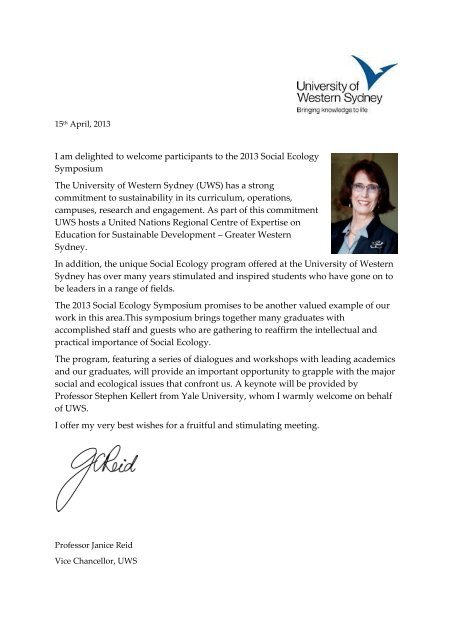
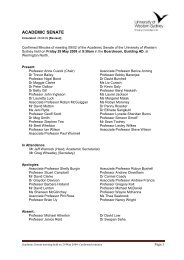
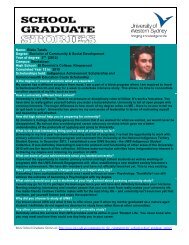
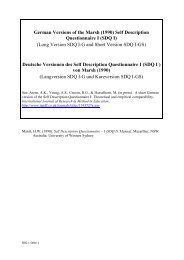
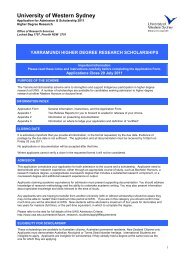
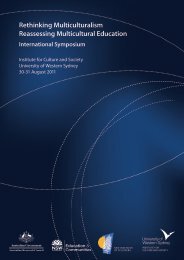
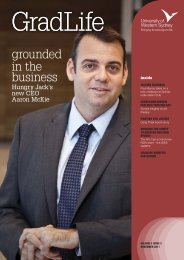
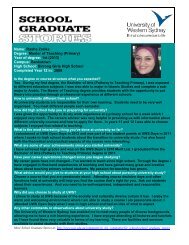
![Glossary of terms for Academic Integration Plans [PDF, 127Kb]](https://img.yumpu.com/46838287/1/184x260/glossary-of-terms-for-academic-integration-plans-pdf-127kb.jpg?quality=85)
